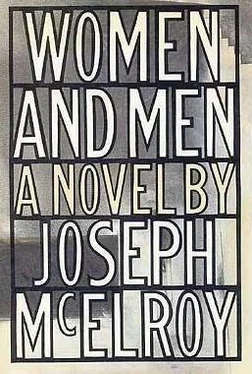What do you see through it? asked the man.
Fire, I said; games, I said (and answering this finely displaced guy was like being traced or calling up the trace in me, you know some old inch of wire with congealed words in it coiled in your gut where you swallowed it a century ago, some mineral that belonged to somebody else and after all this time it’s sort of cushioned and cocooned by your congealed juices and greases but it’s starting to do something, move or give off impatience, I didn’t know and was not accustomed to talk or think in this vague way), fire, games, speed, a touch of war, sky’s the limit, I said. Great American vehicle floating a loan!
Very good, said the Chilean; I see something else.
What is it? I said, and realizing I wanted to find something else to say to this guy — but what? — I said, The unconscious? You sure it’s out there?
Yes; it will be there even after it is gone, said the Chilean (though he may not have meant the unconscious). It is taking us there. It is like a nation, an institution. It is not people, though it is like greed. I say us. I am of the Americas.
It’s people giving their destiny away so it’s all clear and set, I said (not myself). I still hadn’t said "it," I might have said more — even me — but the Chilean who I didn’t yet know was Chilean, much less involved in the government and here in the States on some kind of business apparently for Allende — and I wonder if he got called back or got back or got stuck here, caught here — he stopped me with his eyes that included me in the vista he swept from side to side, the fixed image of the rocket some three miles behind me, the mob on the grass—
— Mmhmm, mob, she murmurs, mob.
What enables the three men to get away, he said, is the same that gets them back, and it goes with them but it stays too.
(Well, this sounded as bad as the trace wire in my gut giving off rays perhaps.)
It has no ordinary body, it can be felt when the blast comes, though I have never seen a blast-off except on television, the red gantry like an oil rig is silhouetted but close up the real thing that stands out in the void of the fire and darkness is the anatomy, you see, the building of the rocket, the bones of the idea. Last night before it was rolled away we saw the mobile service structure against the rocket with a vertical column of slanting parallels that are stairs for the men servicing the rocket but are an idea too: the anatomy—
Whew, I felt—
— the anatomy of some power without a body except mental and a power that also goes with the men, do you see.
I turned, following his eye, the rocket in the side of mine, figuring this man was running a Rudolf Steiner school in Yucatan or was a foreign writer discovering America, and my turning, our turning, reminded me of ancient days, of God knows what, that if the Earth was wasting me, maybe I had some small power, hack that I am, that was a threat to it —and I saw, among the two or three faces looking our way, Spence the journalist, and wondered who he was "with" this time, and I answered this foreign visitor of mine who carried some thread of pain or brave dread lightly so I said only, I think, that through his words I saw God, some emptiness between the upright rocket and the mobile launcher holding it in place, and then the horizontal flat land of scrubby beach coast, O.K.? (you’ve seen it), and that it led me step by step to feel that one Mylar sleeping bag and one astronaut equaled two Mylar sleeping bags and no astronauts, or three and no — talking over my head occasionally. Wasn’t what I’d expected to say, which should have been, What’s your business with that Spence? and I did at last say, What’s with Spence?
Whereupon the Chilean gentleman looked at me and me alone with nothing in his eye, which I realized is a lot more than "very little" in his eye. And he said he was an economist, sort of a statistician (I think that’s how he said it). I said, The nitty gritty. Yes, he said, the "nitty gritty." Esoteric equations, I said, but then he said he didn’t believe anything was equal to anything else, only people were equals. Hell, he meant it in a specialized way; that’s O.K. He was obviously South or Central American; he didn’t have that heaviness Spaniards of that class tend to have, and he was obviously involved with Spence. I don’t know if he meant by my "field" the pieces I had mentioned doing on the relation of certain big mineral partnerships to the growth of multinationals, the Southern Peru Copper Company and the greater freedom the aluminum partnerships have, to shop around for bauxite extraction, and the freedom or lack of it of some U.S. subsidiaries in Australia to export. You know, popular business economics — material you can get from other news services — oh, about risks like Ford rubbering in the Amazon, parent companies parenting. And I stupidly but it was irresistible said, getting the name out in the open, I’m about as knowledgeable as your friend Spence. The man nodded politely — and he half-turned to the Voice of America man and said, Science fiction?
And I remembered Dr. Allende’s amazing speech to the UN just seventy-two hours before.
And I said, No all I meant was that what’s happening in the next room usually matters more to me, you see.
It is through each other that we see, said the Chilean and as he moved away like a cocktail party I felt, So what? — but free — a free agent — but then felt annihilated—
— You said "no reason at all," the girl says; there’s always a reason.
"Annihilated" is a bit strong, but Allende’s words came to me then about "forces which operate in the shadows" — which meant the NIK — we all knew — and I thought, The guy’s from Chile — and then the Voice of America guy with this humorous round face told me the man was an economist who had been spending a few days here; he did not name him; he had met him in Washington where he had had a brother and in New York and when I pressed the V. of A. man he added that a hippy free-lance he had talked to had pointed me out as—
— Wait, I broke in: who was this "he"?
Oh the Chilean gentleman, Dr. Mackenna.
Pointed me out as. .
Oh as a person with connections down there. Railroads, airline, newspapers?
Who on earth told Mackenna this?
(Mackenna was his name? the girl murmurs. . what’s "NIK"?)
The Voice of America man with earphones on raised his hand, listening, and bent to the microphone; looked up again at Mayn and smiled and shrugged.
"Who’s Spence?" the girl mutters, breathes, murmurs tenderly as if her interest in facts themselves is tender and in the dark she’s as young as a very young wife but fairly off somewhere in herself for having both responded so regularly and just about slept through this amalgam.
The guy he ran into in the correspondents’ telephone room at the Press Center in Cocoa Beach — a crook named Ray Spence. NIK equals Nixon and Kissinger, and the I is for CIA.
Mmhmm.
Well, I mixed up the sequence.
Mmhmm. It doesn’t matter.
Communication unvoiced, but telepathy this late is not the issue, the issue is whether what we convey etherially to each other is worth it.
A crook, did I say? First of all, a bit of a character, a subsidiary worm, probably a minor monster.
But this Chilean: tall, dark, bald, the Chilean whom he (Mayn) hadn’t yet known was Chilean had been waiting to use a phone it seemed, for they were all in use, but waiting so detached that he could contemplate Mayn.
The man returned my look which I held just longer than I’d meant to and he gave a bow and I saw two men I knew and I went and talked to them without finding out if they knew as little as I did about space. Then, with his dark glasses propped on his hair — ponytail behind — and torturing his mouth into the sinew of some smile, Spence came in, or was in the doorway, and was the one the Chilean apparently was waiting for, but you couldn’t be entirely sure. Spence waved a sideways wave like a saxophonist I know to me with eyes lowered as if we both knew something. Then a switch-off, and I didn’t exist.
Читать дальше












